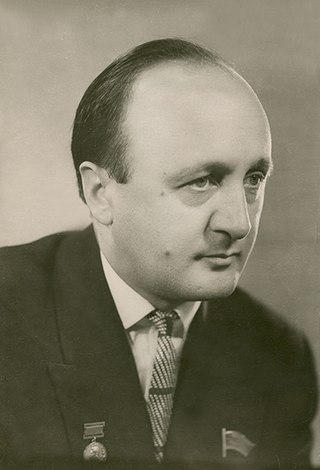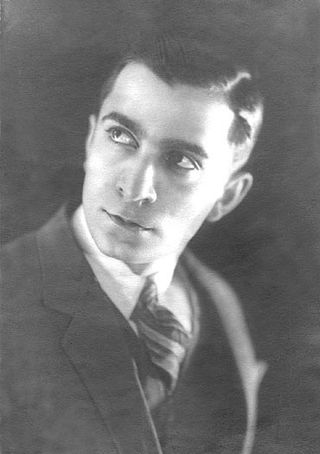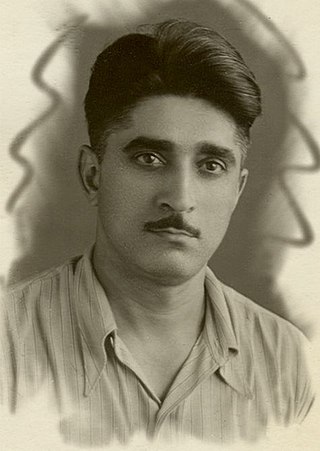Related Research Articles

Uzeyir bey Abdulhuseyn bey oghlu Hajibeyov was an Azerbaijani composer, musicologist and teacher. He is recognized as the father of Azerbaijani classical music.

Fikret Mashadi Jamil oghlu Amirov was a prominent Soviet and Azerbaijani composer.

The Hajibeyov Baku Academy of Music is a music school in Baku, Azerbaijan. It was established in 1920 in Baku and was previously known as the Hajibeyov Azerbaijan State Conservatoire.

Gamar Hajiaga qizi Almaszadeh was a Soviet and Azerbaijani ballerina and ballet instructor. She's considered the first ballerina of the Muslim world.

Afrasiyab Badal bey oghlu Badalbeyli was a Soviet Azerbaijani composer, with noble Iranian origins (he was the descendant of Bahman Mirza and Abbas Mirza," conductor and music critic, author of the music and libretto of Giz Galasi, the first Azerbaijani ballet and the first ballet in the Middle East.

Shamsi Badal oghlu Badalbeyli was an Azerbaijani theatre director and actor.

Vagif Mustafazadeh, also known as Vaqif Mustafa-Zadeh, was a Soviet-Azerbaijani jazz pianist and composer, acclaimed for fusing jazz and the traditional Azerbaijani folk music known as mugham. According to many world famous jazz musicians, Mustafazadeh is one of the pioneers and "the architect of jazz in Azerbaijan".
Jahan Mir Rzakhan qizi Talyshinskaya was an Azerbaijani folk singer and theatre actress.

Balaban or balaman is cylindrical-bore, double-reed wind instrument about 35 centimetres (14 in) long with eight finger holes and one thumb hole. This instrument is played in the eastern part of Iran's historic Azerbaijan region as well as in the Republic of Azerbaijan. Balaban, Mey, and Duduk are almost identical, except for historical and geographical differences.

Tofig Ahmed-agha oglu Bakikhanov is a composer. He was awarded the title People's Artiste of the Azerbaijan SSR (1990).

Nizami is a historical opera written in 1939 by the composer Afrasiyab Badalbeyli. It is telling about the life of the poet Nizami Ganjavi. The music and the libretto of the opera were written by Afrasiyab Badalbeyli based on the plot and motives of Mammad Said Ordubadi's novel the "Sword and Feather". The premiere of the opera took place on 12 December 1948 at the Azerbaijan State Opera and Ballet Theatre.

Azerbaijani folk music combines the distinct cultural values of all civilisations that have lived in Azerbaijan and Iranian Azerbaijan region.
Mugham trio or mugham triads is a classical ensemble of three Azerbaijani national musical instruments: tar, kamancheh, and qaval performers. It is a traditional musical group of Azerbaijani musicians who perform the mugham repertoire and represent the ensemble of khanandas and sazandas.
Ashraf Jalal oghlu Abbasov was an Azerbaijani composer, professor, Honored Art Worker of the Azerbaijan SSR, People's Artist of the Azerbaijan SSR.
Aida Hamdulla gizi Abdullayeva was an Azerbaijani Soviet harpist, teacher, professor at the Baku Music Academy, founder of the Azerbaijan School of Harp Performance, Honored Artist of the Azerbaijan SSR (1972). She is known as the first Azerbaijani harpist.
Ramiz Haji oghlu Mustafayev was an Azerbaijani composer, People's Artist of the Azerbaijan SSR, Laureate of the Shohrat Order.

Mirza Mansur Mashadi Malik oghlu Mansurov was an Azerbaijani tar player, pedagogue, Honored Art Worker of the Azerbaijan SSR.
Zakir Javad oghlu Baghirov was an Azerbaijani composer, professor, and Honored Art Worker of the Azerbaijan SSR.

Gubad Abdulla oglu Gasimov was an Azerbaijani and Soviet musicologist, Honored Worker of Culture of the AzSSR (1968), Candidate of Historical Sciences (1949).
Aghababa Aliheydar oghlu Salahov was an Azerbaijani tar master, Honored Artist of the Azerbaijan SSR (1964).
References
- ↑ Qafarov S. (2 November 2016). "Səadət Abdullayeva". abm.musigi-dunya.az. Archived from the original on 7 May 2021. Retrieved 14 February 2024.
- ↑ Abdullayeva S. (30 July 2019). "Azərbaycan xalq çalğı alətləri (musiqişünaslıq-orqanoloji tədqiqat)" (PDF). Musiqi Kitabxanası. Archived from the original (PDF) on 30 July 2019. Retrieved 14 February 2024.
- ↑ Səadət SEYIDOVA, Imruz ƏFƏNDIYEVA (6 February 2011). "BIR MUSIQIŞÜNAS ÖMRÜNÜN SƏHIFƏLƏRI". www.musigi-dunya.az. Archived from the original on 24 January 2022. Retrieved 14 February 2024.